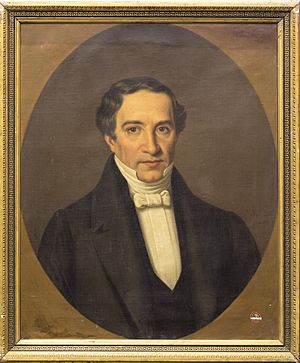José María Bocanegra facts for kids
Quick facts for kids
José María Bocanegra
|
|
|---|---|

Portrait of José María Bocanegra
|
|
| 3rd President of Mexico | |
| In office 18 December 1829 – 23 December 1829 |
|
| Vice President | Pedro Vélez |
| Preceded by | Vicente Guerrero |
| Succeeded by | Pedro Vélez |
| President of the Chamber of Deputies | |
| In office 28 December 1826 – 31 January 1827 |
|
| Preceded by | Juan Cayetano Portugal |
| Succeeded by | Juan Cayetano Portugal |
| Member of the Chamber of Deputies for Zacatecas |
|
| In office 1 January 1827 – 24 January 1829 |
|
| Member of the National Institutional Junta for Zacatecas |
|
| In office 2 November 1822 – 29 March 1823 |
|
| Member of the First Constituent Congress for Zacatecas |
|
| In office 24 February 1822 – 31 October 1822 |
|
| Personal details | |
| Born | 25 May 1787 Labor de la Troje, Nueva Galicia, New Spain (now Calvillo, Aguascalientes, Mexico) |
| Died | 23 July 1862 (aged 75) Mexico City |
| Nationality | |
| Political party | Popular |
José María Bocanegra (Spanish pronunciation: [xosemaˈɾia bokaˈneɣɾa]) was an important Mexican lawyer and politician. He was born on May 25, 1787, and passed away on July 23, 1862. He is best known for serving a very short time as the interim president of Mexico in December 1829. This happened during a difficult time when there was a rebellion against President Vicente Guerrero.
Congress chose Bocanegra to be president for a few days while President Guerrero was away fighting the rebels. However, after only five days, the rebels took over the National Palace. They removed Bocanegra from office and set up a new government led by Pedro Vélez.
Contents
Early Life and Career
José María Bocanegra studied law at the Colegio de San Ildefonso in Mexico City. He became a lawyer and worked for the government's highest court, called the Audiencia, during the time Mexico was a Spanish colony. He also helped manage a charity for the poor.
When Mexico became independent, Bocanegra supported Agustín de Iturbide becoming emperor. However, he disagreed when Iturbide started to rule too strictly. In 1824, Bocanegra became a representative in the first Mexican Congress, which was working to create a new constitution for the country.
Serving in Government
In 1827, Bocanegra joined the Chamber of Deputies, which is like a part of the Mexican Congress. On January 26, 1829, President Guadalupe Victoria chose him to be the Minister of Internal and External Relations. This meant he was in charge of both domestic affairs and Mexico's relationships with other countries. He kept this important job when Vicente Guerrero became president, serving until April 1, 1829.
Brief Presidency of Mexico
In December 1829, the Vice-President, Anastasio Bustamante, started a rebellion against President Guerrero. This event is known as the Plan de Jalapa. President Guerrero got permission from Congress to leave the capital and lead his troops to fight the rebels.
Because President Guerrero was away, Congress needed someone to lead the country temporarily. On December 16, 1829, they appointed José María Bocanegra as the interim president. He officially took office on December 18. His presidency lasted only six days. On December 23, the military in Mexico City joined the rebellion. They removed Bocanegra from power and set up a temporary government with three leaders: Pedro Vélez, Lucas Alamán, and Luis de Quintanar. After this, Bocanegra went back to working as a lawyer.
Later Political Roles
Even after his short time as president, Bocanegra continued to serve Mexico. He worked as the Minister of the Treasury, managing the country's money, under presidents Valentín Gómez Farías and Antonio López de Santa Anna in 1833.
Later, he also served as the Minister of External Relations and the Treasury again. He held these roles under presidents Santa Anna, Nicolás Bravo, and Valentín Canalizo until August 1844.
Legacy and Family
José María Bocanegra was known as an honest and skilled person. He didn't always enjoy politics, but he felt it was his duty to serve his country. He wrote a book about Mexico's history after it became independent, called Memorias para la Historia de México Independiente.
His nephew, Francisco González Bocanegra, became famous for writing the words to the Himno Nacional Mexicano, which is the Mexican National Anthem. José María Bocanegra passed away in Mexico City on July 23, 1862, at the age of 75.
See also
 In Spanish: José María Bocanegra para niños
In Spanish: José María Bocanegra para niños
 | Isaac Myers |
 | D. Hamilton Jackson |
 | A. Philip Randolph |

